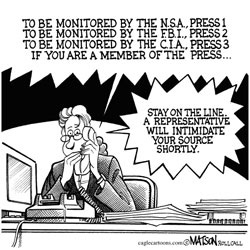 |
 |
 |
 News from Around the Americas | May 2006 News from Around the Americas | May 2006  
Gonzales Says Prosecutions of Journalists Are Possible
 Adam Liptak - NYTimes Adam Liptak - NYTimes


| | National Surveillance Call Center (Art: RJ Matson/Yubanet) |
Editor's Comment: Even if no further action is taken, the Attorney General of the United States going on national television and warning that journalists can be prosecuted for what they print is a chilling blow to "Freedom of the Press." - smg

The government has the legal authority to prosecute journalists for publishing classified information, Attorney General Alberto R. Gonzales said yesterday.

"There are some statutes on the book which, if you read the language carefully, would seem to indicate that that is a possibility," Mr. Gonzales said on the ABC News program "This Week."

"That's a policy judgment by the Congress in passing that kind of legislation," he continued. "We have an obligation to enforce those laws. We have an obligation to ensure that our national security is protected."

Asked whether he was open to the possibility that The New York Times should be prosecuted for its disclosures in December concerning a National Security Agency surveillance program, Mr. Gonzales said his department was trying to determine "the appropriate course of action in that particular case."

"I'm not going to talk about it specifically," he said. "We have an obligation to enforce the law and to prosecute those who engage in criminal activity."

Though he did not name the statutes that might allow such prosecutions, Mr. Gonzales was apparently referring to espionage laws that in some circumstances forbid the possession and publication of information concerning the national defense, government codes and "communications intelligence activities."

Those laws are the basis of a pending case against two lobbyists, but they have never been used to prosecute journalists.

Some legal scholars say that even if the plain language of the laws could be read to reach journalists, the laws were never intended to apply to the press. In any event, these scholars say, prosecuting reporters under the laws might violate the First Amendment.

Mr. Gonzales said that the administration promoted and respected the right of the press that is protected under the First Amendment.

"But it can't be the case that that right trumps over the right that Americans would like to see, the ability of the federal government to go after criminal activity," he said. "And so those two principles have to be accommodated."

Mr. Gonzales sidestepped a question concerning whether the administration had been reviewing reporters' telephone records in an effort to identify their confidential sources.

"To the extent that we engage in electronic surveillance or surveillance of content, as the president says, we don't engage in domestic-to-domestic surveillance without a court order," he said. "And obviously if, in fact, there is a basis under the Constitution to go to a federal judge and satisfy the constitutional standards of probable cause and we get a court order, that will be pursued." | 
 | |
 |



